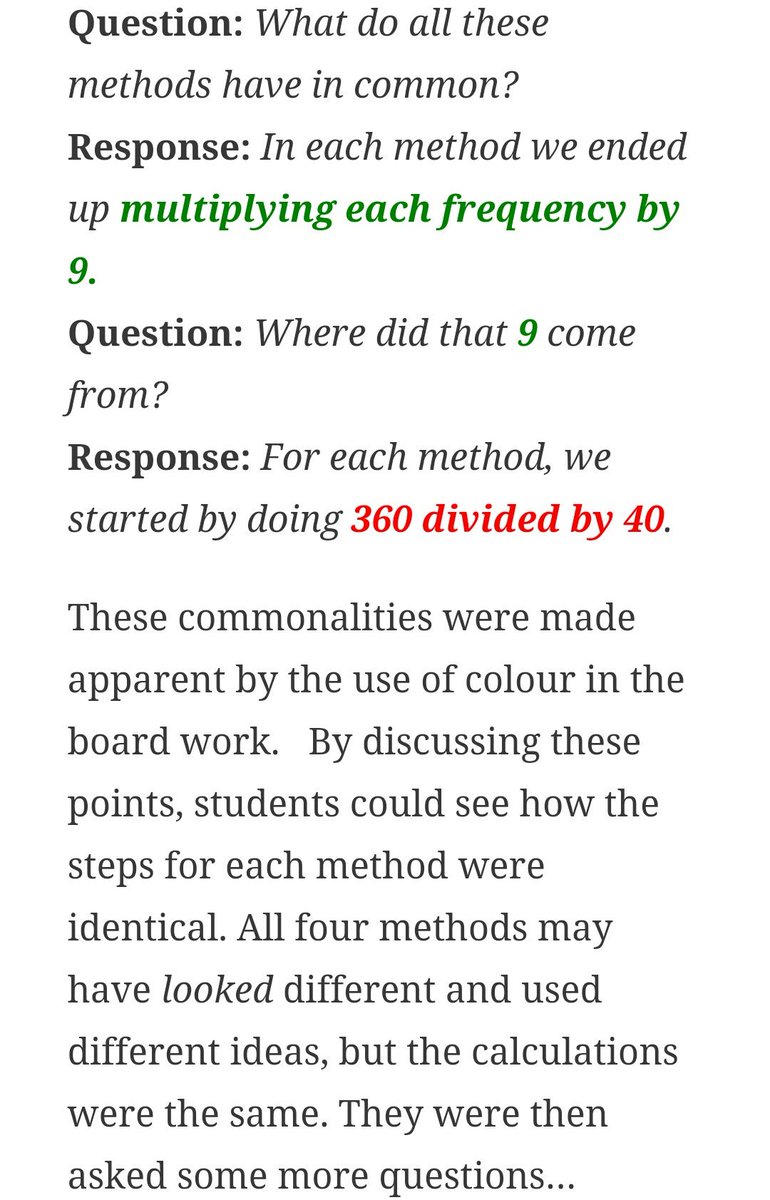This week, and as a follow up to my recent interviews with Adrian Simpson (critiquing the meta-analysis) and John Hattie (defending it), We're starting off with a summary that I put together of an interesting article by Scott Eacott on the ‘cult of the guru'. Hope you enjoy this first takeaway.
T2 and T3 are two of my favourite types of blog posts. Posts by teachers, for teachers, about exactly what they're doing in their classrooms, and drawing on educational research. T2 is particularly great if you teach maths, T3 is particularly great if you teach chemistry, and they're both great if you teach at all!
T4 is a really interesting piece by Harry Fletcher-Wood on running an assembly that challenged students' ideas of the purpose of learning. I think it's a really creative an impactful way to run an assembly on this topic.
T5 is some great maths resources for teachers
T6 is an interesting way to categorise assessments
And I'll let you check out T7, 8, and 9 if your interest is piqued by the headings.
Enjoy : )
(all past TOTs here), sign up to get these articles emailed to you each week here.
School leadership and the cult of the guru: the neo-Taylorism of Hattie, via @ScottEacott
During my recent chat with John Hattie I asked him why his work has become so prominent. He offered some thoughts, but concluded ‘I don’t know’. I just read @ScottEacott’s 2017 paper, which offers an interesting perspective on this question. (scotteacott.com/wp-content/upl…) Eacott suggests that dominant media representations of Australian education in decline (which is compounded by the frequency of gov’t inquiries into Aus tchreducation, see Louden on ‘101 damnations’) created a void ripe for a normative narrative (someone to tell us what to do)

Coupled with this, @ScottEacott draws a parallel between Hattie’s metric-based approach to ‘What works’ in education, and Taylorism (aka: scientific management), suggesting that such an approach allows ed researchers and leaders to talk administrators’ language.

Significantly, Eacott suggests that the pre-existing work on quality teaching didn’t sufficiently speak this language. This, coupled with a hunger for novelty, meant that much pre-existing work was cast aside. (How many Aussie teachers have heard of Newmann, Mills, or Ladwig?)

Related:I interviewed Prof. Jenny Gore on the Quality Teaching Rounds (QTR) approach to teacher peer-observations, which builds on the work of Newmann, Mills, and Ladwig. Have used the QTR tool over the past 2 weeks, it’s been great. (ollielovell.com/errr/jennygore/) On the topic of oldies but goodies (this time from the 70’s), I’ve recently been getting interested by the work of Graham Nuthall and his NZ contemporaries such as John Church and David Hughes. I’ll tweet on some of this stuff soon, but here’s a snippet 4 now (Nuthall, 2001, p.6)

Back to @ScottEacott’s paper: The following paragraph outlines this part of Eacott’s argument (the language of administrators/out with the old, in with the new) most strongly.

.@ScottEacott questions to what extent searching for ‘what works best’ is a valid or helpful project. This reminds me of Adrian Simpson’s: We shouldn’t be asking ‘what works best?’ but instead, ‘What works for whom, where, under what circumstances, and for what purpose?

It’s important to note that this paper isn’t an attack on any one person, it’s simply highlighting the social context that’s facilitated the rise of AN educational guru, and the dangers of following one voice. This is a message Hattie advocates as strongly as anyone.

Procedural & Declarative Knowledge, and teaching about mol., via @Mr_Raichura
I love it when teachers explicitly blog about something they've taught, and why they've done it that way. Bonus points cog Sci basis. Full marks to @Mr_Raichura on this one! (+, loving the TLAC reference) https://t.co/EesabeRgT1 pic.twitter.com/TCGJ764rqT
— Oliver Lovell (@ollie_lovell) June 1, 2018
Top notch set of three blog posts on developing proportional reasoning and integrating the maths curriculum, via @Mr_Rowlandson
Original twitter thread here.
Oh boy oh boy. This is starting to get juicy! Proportional reasoning. Helping our students to make connections. Via @Mr_Rowlandson thanks for the heads up @mrbartonmaths (ponderingplanning.wordpress.com/2018/05/24/man…)

Check it. Love this. It's like deliberate practice of interleaving!!! (also, that first tweet was from the first post in the series)

Then there's this from the third post.

Gold.

What impact could one assembly have on students' views of learning? via @HFletcherWood
Interesting piece on how an assembly influenced the thinking of 80 students about the purpose of education. https://t.co/DNWXjsyRIf via @HFletcherWood. I liked this bit. pic.twitter.com/2Vl8tpDUog
— Oliver Lovell (@ollie_lovell) June 2, 2018
Two great maths websites, including the work of @taylorda01 and @DrFrostMaths
Two fantastic websites with lots of maths questions. UK Maths Trust, https://t.co/rj3dYDrFsL, Mr. Taylor's increasingly difficult questions. https://t.co/21foMQ6Xei Thanks for the heads up @mrbartonmaths This is probs the best perimeter worksheet I've ever seen! (from Mr Taylor) pic.twitter.com/qVlObaHBO5
— Oliver Lovell (@ollie_lovell) June 7, 2018
For UK Maths challenge questions look at the database of them collated by the amazing @DrFrostMaths https://t.co/xbznjQCDGp the rest of his website is well worth a look too.
— Nicke Jones (@NEdge9) June 7, 2018
An assessment map, via @DylanWiliam
An assessment map! Found in Wiliam, D. (2014). Principled assessment design.
(p. 87) https://t.co/9FV6GACb59 You'll like this @mrbartonmaths pic.twitter.com/0ARIjPkn98— Oliver Lovell (@ollie_lovell) June 4, 2018
Hart and Risley's '30 million word gap' research has not been debunked, via @DTWillingham
“The “Debunking” of Hart & Risley and How We Use Science” https://t.co/e2d12gJPu7 via @DTWillingham pic.twitter.com/OTrYt3C4z0
— Oliver Lovell (@ollie_lovell) June 4, 2018
How can schools make use of evidence to reduce teacher workload?
How can schools make use of evidence to reduce teacher workloads? https://t.co/T79hAtIhaQ
— Oliver Lovell (@ollie_lovell) June 4, 2018
Taking a photo of something impairs your memory of it
“Taking a photo of something impairs your memory of it, but the reasons remain largely mysterious” interesting article. I especially like this part about ‘transactive memory' https://t.co/LTidoOoILA pic.twitter.com/b5BS3pKiJm
— Oliver Lovell (@ollie_lovell) June 1, 2018